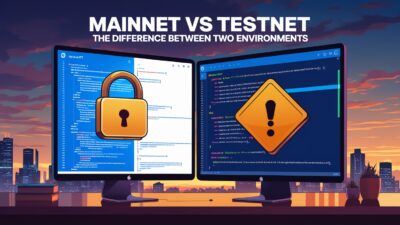
If you’re going to hold cryptocurrency, you’re going to need somewhere safe to store it. This is where the crypto wallet comes in, one of the most crucial concepts in DeFi.
Wallets are where you safely store the private keys that allow you, and you alone, to access your crypto assets. But not all wallets are the same.
Hardware wallets, also known as cold wallets, are the most secure and reliable way to store your private keys. If you’re serious about security, this is the way to go.
In this article, we’ll look at the different types of crypto wallets, the benefits of choosing a hardware wallet, and some of the best hardware wallet options in 2025.
Understanding Different Types of Crypto Wallets
Here are the main types of crypto wallets you’ll find:
Custodial wallets
Custodial wallets work like a traditional bank account, where a third party like Binance or Coinbase manages your private keys on your behalf. It’s easy, convenient, and you don’t need to worry about remembering or protecting your keys, but you do surrender control over your funds, so you’ll need to fully trust your chosen platform.
Non-custodial wallets
In contrast to custodial wallets, non-custodial wallets give you complete control over your private keys. They are less convenient, and you must be fully responsible for your keys; however, this means an unparalleled level of autonomy and control over your assets.
Hot wallets (software wallets)
These wallets are stored digitally on a device connected to the internet, such as a smartphone or desktop computer. This means your information is easily accessible, which is convenient if you make frequent transactions. Still, the downside is that it can be susceptible to cyber threats, such as hacking or malware. Some popular software wallets are MetaMask and Trust Wallet.
Cold wallets (hardware wallets)
Hardware wallets are physical devices designed to store your private keys entirely offline. The fact that they’re offline makes them resistant to online threats and cybercrime, and they’re generally regarded as the most secure method for storing cryptocurrency. This is especially true for large amounts of crypto and long-term holdings.
Other wallets
There are a few other wallet types to be aware of. For example, multi-signature wallets require multiple private keys to authorize any transaction, and are often used by DAOs. Smart contract wallets are governed by programmable logic, which enables features such as spending limits or social recovery.
Why Choose a Hardware Wallet for Crypto Storage?
The primary advantage of a hardware wallet is its security. Simply put, this is the most secure method of storing your private key that you are likely to find.
Hardware wallets are significantly less likely to be hacked or infiltrated; they aren’t dependent on any software or third-party device, and they’re an excellent choice for long-term storage that may outlive any specific program.
Unfortunately, exchange hacks remain a persistent problem in the cryptocurrency world, with $2.2 billion stolen from exchanges in 2024 alone. Having complete ownership of your private keys with a hardware wallet protects you from this threat and gives you absolute control over your assets.
Our Ranking Criteria
Now, it’s time to examine the best hardware wallets available in 2025. First, we’ll share the criteria we used to make this list. We looked at factors like:
- What security features does the wallet use? For example, does it contain a Secure Element (SE) Chip to protect the contents from being extracted?
- Which cryptocurrencies does it support? Not all wallets support all cryptos.
- How easy is the wallet to use? Some hardware wallets are very basic, with just a few buttons, while others feature touchscreens and more advanced user interfaces.
- Is it good value for money? Hardware wallets can cost hundreds of dollars, but you don’t need to break the bank to get a solid, secure device.
- Is the wallet compatible with your mobile device and your desktop? While your wallet exists offline, you’ll still want to connect it to other devices to make transactions and manage your funds.
- Does the wallet have a good reputation and firmware support? Take the time to read other users’ reviews of a wallet before committing to it. Also, your chosen wallet should regularly update its firmware to patch vulnerabilities and improve the user experience.
10 Best Crypto Hardware Wallets Ranked
There are numerous hardware wallets available, each with its pros and cons. We’ve put together this list of 10 of the best options to help you get started.
For each wallet, we’ve shared both the pros and cons, as well as our recommendation for who it’s best suited for.
1. Ledger Nano X
The Ledger Nano X is shaped like a flash drive and built by Ledger, a leading provider in the crypto security space. It supports multiple cryptocurrencies and integrates seamlessly with the Ledger Live desktop and mobile apps.
What we liked
- A ton of asset support, capable of storing over 5,500 different cryptocurrencies, including major tokens like Bitcoin, Ethereum, and Ripple
- Bluetooth connectivity to easily link to the Ledger Live app on iOS and Android
- Easy management of DeFi apps and NFTs through Ledger Live
- Strong security with a Secure Element (SE) chip (CC EAL5+ certified) to protect private keys offline
Things we didn’t like
- It uses closed-source firmware, which means you can’t publicly audit the code and need to trust Ledger’s internal security processes.
- There’s no browser extension (it was discontinued in 2024)
- It can sometimes be challenging to manage and transfer NFTs from older Ledger models.
Pricing
The Ledger Nano X costs $149.
Who’s it best for?
This wallet is ideal for users seeking a secure and versatile hardware wallet that supports a wide range of cryptocurrencies. It seamlessly integrates with mobile and desktop apps, supporting DeFi and NFT management. If security and convenience both matter to you, the Ledger Nano X is a great choice.
2. Trezor Model T
The Trezor Model T, built by SatoshiLabs, combines great security features with a user-friendly interface. It’s an upgrade to the Trezor One, featuring a color touchscreen and improved usability.
Things we liked
- A big and full-color touchscreen display where you can enter your PIN and passphrase and verify transactions directly on the device
- Private keys are isolated offline and protected by PIN and passphrase. The device supports U2F and FIDO2 authentication.
- Open-source firmware, which means the public and view and audit the code
- Easy to buy cryptocurrency directly within the Trezor Wallet app using fiat currency, so there’s less need for external exchanges.
- Compatible with a broad range of platforms like Windows, macOS, Linux, multiple web browsers, and Android mobile devices
Things we didn’t like
- No native support for iOS devices (bad news, iPhone users)
- A limit on the cryptocurrencies that can be bought with fiat within the wallet
- Not waterproof
Pricing
Before tax and shipping, the price is $129 for this wallet.
Who’s it best for?
The Trezor Model T is an excellent choice for beginners seeking a secure and user-friendly wallet with a touchscreen interface.
3. Ledger Nano S Plus
The Ledger Nano S Plus is Ledger’s most affordable hardware wallet, yet it remains extremely secure. It builds on the Nano S, with an upgraded screen and more storage space.
Things we liked
- For $79, this wallet gives you great security at a budget-friendly price.
- Support for over 5,500 different cryptocurrencies, including Bitcoin, Ethereum, Solana, and multiple stablecoins
- User-friendly design with a large screen and an intuitive interface compared to its predecessor
- Strong security with a CC EAL5+-certified Secure Element chip for offline private key storage and regular firmware updates
- Integrates with DeFi applications and NFT platforms via the Ledger Live app
Things we didn’t like
- No Bluetooth connectivity, unlike the Nano X, so you need a USB connection for mobile use.
- Closed-source firmware, so the community can’t audit the code.
- Limited support for iOS users
Pricing
The Ledger Nano S Plus costs $79 new.
Who’s it best for?
This is a fantastic choice if you want a secure and functional wallet at a price that won’t break the bank. It supports a wide range of cryptocurrencies and provides excellent customer support.
4. Keystone Pro (formerly Cobo Vault)
With the Keystone Pro, you’ll get an open-source hardware wallet that emphasizes complete isolation from all network risks and uses a large touchscreen for easy use.
Things we liked
- Fully air-gapped, it operates completely offline, utilizing QR codes and microSD cards for data transfer. This means private keys never enter an online environment for ultimate protection against hacking.
- Uses three independent Secure Element chips from different manufacturers, each of which is EAL5+ certified, which means a multi-layered defense against physical attacks
- Fully open-source software and hardware
- Support for up to three separate seed phrases, which means more security and organization for different asset classes
- A large touchscreen and fingerprint verification for smooth, secure access
Things we didn’t like
- At $149, it’s a bit pricey compared to some other hardware wallets.
- Some users report a shorter battery life.
- It requires separate microSD cards for some operations.
- There are no built-in swapping or staking features
Pricing
The Keystone Pro costs $129.
Who’s it best for?
This wallet is an excellent choice for those with a high-value portfolio who require the highest level of security. It’s better for more advanced users who are comfortable with offline transaction methods.
5. SafePal S1
The SafePal S1 is a fully offline hardware wallet backed by Binance. It’s the same size as a credit card, which means it’s extremely portable and offers stringent security features.
Things we liked
- It operates completely offline, with no Bluetooth, Wi-Fi, NFC, or USB connectivity, and utilizes QR codes with a built-in camera for transactions.
- Strong security features, including an EAL 5+ secure element, a random number generator, and even a self-destruct mechanism that wipes sensitive data if tampering is detected
- Support for over 30,000 tokens across more than 100 blockchains
- Small, lightweight, and easy to carry around
- When offline, it pairs with the SafePal App via QR codes, allowing you to securely and easily manage your assets and interact with dApps.
Things we didn’t like
- It may be a little on the complex side for beginners
- Short battery life when in use
- The self-destruct feature doesn’t always work correctly
Pricing
At $49, the SafePal S1 is competitively priced.
Who’s it best for?
This wallet is ideal if you want maximum air-gapped security, along with great portability and support for a wide range of cryptocurrencies and NFTs. If you’re comfortable with QR-code-based transactions, the SafePal S1 could be a great choice.
6. NGRAVE ZERO
The NGRAVE ZERO has the highest possible rating for its operating system, which means excellent security and numerous advanced features.
Things we liked
- The only air-gapped wallet to receive the EAL7 security rating for its iOS, so you know it’s exceptionally secure.
- It’s fully air-gapped, so you can complete transactions without ever connecting to the internet.
- Generates private keys offline using a mix of biometric data, light sensor readings, and manual key shuffling for ultimate randomness
- Biometric security with a fingerprint sensor for access and transaction authorization
- A high-resolution touchscreen with a 4-inch color display
Things we didn’t like
- It doesn’t come cheap, at $398 for the wallet and $498 if you opt for the graphene backup.
- Setup may be complex for new users.
- It’s newer, so less established than brands like Ledger or Trezor
Pricing
NGRAVE ZERO costs $398, and the combo pack with GRAPHENE backup costs $498.
Who’s it best for?
This wallet is a good choice for individuals who are willing to pay a premium for an exceptionally high level of security and are comfortable with a complex setup process.
7. CoolWallet Pro
The CoolWallet Pro is another credit card-sized hardware wallet that offers easy mobile integration via Bluetooth. In addition to security, it also supports DeFi, dApp, and NFT transactions.
Things we liked
- It’s small, lightweight, and easy to carry around, even in your (normal) wallet.
- It easily connects to Android and iOS devices with Bluetooth.
- A CC EAL6+ military-grade security chip, which offers a high level of protection
- It supports up to 16 cryptocurrencies and integrates with DeFi, DApp, and NFT platforms.
- Water-resistant and tamper-proof
- Strong battery life with a standby period of 2-3 weeks on a full charge
Things we didn’t like
- The Bluetooth connection has a limited range.
- This wallet doesn’t support as many cryptocurrencies as some competitors, although it does support the major ones.
Pricing
The CoolWallet Pro costs $149.
Who’s it best for?
This wallet will be a good choice if you want the option to carry it with you wherever you go. It’s also a good fit for users who want easy mobile integration.
8. BitBox02
The BitBox02 is minimalist and discreet without compromising on security. It’s also open-source and offers both multi-chain and Bitcoin-only versions.
Things we liked
- It’s fully open-source, which allows for public audits and a high level of transparency and trust.
- There’s a Bitcoin-only edition with limited firmware, which reduces the attack surface for purists focused solely on Bitcoin.
- Instant backup and recovery via a microSD card, so you don’t need to manually write down your 24-word seed card (unless you want to)
- A dual chip design for better security
- Invisible touch sensors and a built-in USB connector for easy setup and use
- End-to-end encryption for all communication between the device and the app
Things we didn’t like
- Limited support for coins in the multi-coin version
- No Bluetooth connectivity
- The minimalist design means a smaller display
Pricing
$173 each for the multi-coin and Bitcoin-only editions.
Who’s it best for?
The BitBox02 is ideal for security-conscious users seeking a straightforward and highly portable hardware wallet. The Bitcoin-only version is a great choice for Bitcoin maximalists.
9. D’Cent Biometric Wallet
This hardware wallet was the first ever to integrate biometric fingerprint authentication. It also supports a wide range of cryptocurrencies and comes with a user-friendly mobile app.
Things we liked
- Biometric fingerprint authentication, so you can unlock the wallet and sign transactions easily
- Support for more than 4,500 cryptocurrencies across 65+ blockchains
- A certified CC EAL5+ chip with anti-tamper features
- A user-friendly mobile app
Things we didn’t like
- No desktop app, just mobile
- No 24/7 customer support
- Some users find it a little larger than other portable wallets
Pricing
Starts at $159.
Who’s it best for?
The D’Cent is best suited for individuals interested in innovative security features, such as biometric authentication, and value a convenient and mobile-first user experience.
10. SecuX V20
The SecuX V20 is designed for the secure storage of cryptocurrencies and NFTs, and features a large color touchscreen and a variety of connectivity options.
Things we liked
- A large, 2.8-inch color LCD touchscreen makes navigation, verifying transactions, and NFT viewing easy and enjoyable.
- Support for over 10,000 coins and tokens across more than 300 chains, as well as support for NFTs on Ethereum
- Bluetooth 5.0 BLE and USB Type-C connectivity
- CC EAL5+ certified Secure Element chip (Infineon SLE 97) for offline private key storage, along with PIN protection, dynamic keypad, and hidden wallet/passphrase options.
Things we didn’t like
- It’s on the larger size compared to some of its more portable counterparts
- The learning curve may be a little steep for beginners
Pricing
$139 on the official website.
Who’s it best for?
If you’re looking for a versatile and secure hardware wallet that supports both cryptocurrency and NFT storage, featuring a large and high-quality touchscreen, the SecuX V20 is a great option.
How to Choose the Right Hardware Wallet for Your Needs
Choosing a hardware wallet involves several key criteria. You’ll want to consider your budget, compatibility with all your existing devices and apps, and your storage needs. Do you primarily want to store crypto, NFTs, or access other DeFi services? Consider user experience as well: some users prefer a high-resolution touchscreen, while others prioritize robustness.
Tips to Keep Your Hardware Crypto Wallets Safe
Here are a few tips to keep your hardware wallet as safe as possible:
- Always buy your wallet directly from an official, trusted source like the manufacturer’s website.
- Be very careful with your seed phrase and don’t share it with anyone. Store it in a waterproof, fireproof, highly secure place.
- Set strong PINs and passphrases within your wallet.
- Verify any transaction details before confirming, including the recipient’s address and the amount
- Keep all firmware and companion apps updated, and always download updates from the manufacturer’s official website only
Wrapping Things Up
If you care about the security of your crypto assets, a good hardware wallet is one of the best investments you can make. There’s a lot to learn, though, so take the time to get familiar with all the concepts we shared here and browse the options available to you.
On the Dypto Crypto website, you’ll find a ton of resources to learn more about crypto, like key terms, guides, and a weekly newsletter.
Frequently Asked Questions (FAQs)
Q: What is the most secure crypto hardware wallet?
There are lots of highly secure crypto wallets. One example is the NGRAVE ZERO, which has the highest possible security rating (EAL7).
Q: Can a hardware wallet be hacked?
Yes, hackers can sometimes gain physical access to a hardware wallet. The best wallets have security features to protect you even in this unlikely event.
Q: Are hardware wallets safe for beginners?
Yes, some are more beginner-friendly than others, like the Trezor Model T.
Q: How much do hardware wallets cost?
Prices for hardware wallets range from around $50 to hundreds of dollars. It all depends on what you need and your budget.
Q: What happens if I lose my hardware wallet?
If you lose your hardware wallet, you can still access your funds with your recovery phrase (or seed phrase). Just get a new wallet and use the phrase to regain access.


























































































